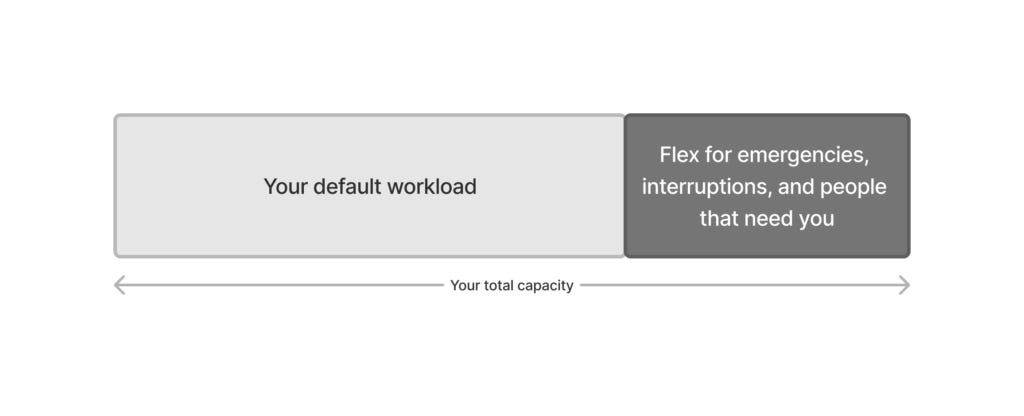核心概念
Effective productivity is not about managing time but about managing your capacity and energy levels to optimize output and quality of work.
摘要
In the quest for productivity, it's crucial to focus on managing your capacity rather than just time. Understanding your energy levels and allocating workload effectively can significantly impact your performance. By leaving room for unexpected events and balancing tasks that energize you with those that drain you, you can maintain a high level of capacity and productivity throughout your workweek.
客製化摘要
使用 AI 重寫
產生引用格式
翻譯原文
翻譯成其他語言
產生心智圖
從原文內容
前往原文
theengineeringmanager.substack.com
Manage your capacity, not your time
統計資料
Your capacity has a fixed upper bound, which may manifest as 3-4 hours in deep work daily.
Tasks draining energy include production incidents, overwhelming input, repetitive toil, conflict, delay, blockers, and overwork.
Tasks energizing you include finding flow in deep work, making progress on projects, achieving goals, helping others, and getting good rest outside of work.
引述
"Understanding your energy levels is key to optimizing the quality of your work."
"Balancing hard work with rest is essential for maintaining high capacity."
從以下內容提煉的關鍵洞見
by James Stanie... 於 theengineeringmanager.su... 02-26-2024
https://theengineeringmanager.substack.com/p/manage-your-capacity-not-your-time
深入探究
How can individuals effectively balance tasks that drain energy with those that energize them?
To effectively balance tasks that drain energy with those that energize, individuals should first identify which activities fall into each category. Tasks that drain energy could include production incidents, overwhelming input, repetitive toil, conflict, delay, blockers, and overwork. On the other hand, tasks that energize might involve finding flow in deep work, making progress on projects, achieving goals, helping others, and ensuring a good work-life balance.
Once these tasks are identified, individuals can create a schedule or plan where they alternate between draining and energizing activities. For example:
Start the day with an energizing task to boost motivation and productivity.
Follow up with a draining task but set limits or breaks to prevent burnout.
Incorporate short breaks throughout the day for quick rejuvenation.
End the day with an activity that brings fulfillment or relaxation.
By consciously balancing these types of tasks throughout the day or week based on individual preferences and energy levels, individuals can maintain a sustainable level of productivity without feeling constantly drained.
What strategies can be implemented to ensure consistent high productivity levels throughout the week?
To ensure consistent high productivity levels throughout the week:
Set Clear Goals: Define specific objectives for each day or week to stay focused and motivated.
Prioritize Tasks: Use techniques like Eisenhower Matrix or ABC prioritization to tackle important tasks first.
Time Blocking: Allocate dedicated time slots for different types of activities (e.g., deep work sessions).
Limit Distractions: Minimize interruptions by turning off notifications or setting specific communication times.
Regular Breaks: Take short breaks between tasks to recharge and maintain focus.
Delegate When Possible: Delegate low-priority tasks if feasible to free up time for critical responsibilities.
Reflect & Adjust: Regularly review progress against goals and adjust strategies as needed for continuous improvement.
Consistency in applying these strategies will help individuals manage their workload efficiently while maintaining high levels of productivity across all days of the week.
How does the concept of managing capacity apply to personal life outside of work responsibilities?
Managing capacity extends beyond professional duties into personal life as well. Just as in work settings where one needs to allocate time wisely among various tasks based on energy levels and priorities,
individuals must also consider how they spend their time outside of work responsibilities:
Personal Energy Management: Recognize activities that replenish your energy (e.g., hobbies you enjoy) versus those deplete it (e.g., excessive screen time). Strive for a balanced routine incorporating both restful activities and stimulating pursuits.
Setting Boundaries: Establish boundaries around personal commitments just as you would at work; learn when it's necessary
to say no so you don't overextend yourself physically or emotionally.
Self-Care Practices: Prioritize self-care habits such as exercise,
meditation,and adequate sleep,to ensure optimal physical
and mental well-being.This helps sustain overall capacity
for handling daily challenges both at home
and in professional environments.
By applying principles from managing capacity within personal life,outside obligations become more manageable,and overall well-being is enhanced through improved efficiency,time management,and stress reduction
0
